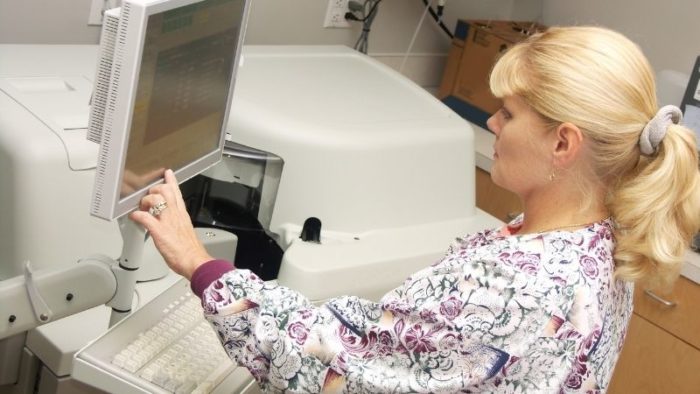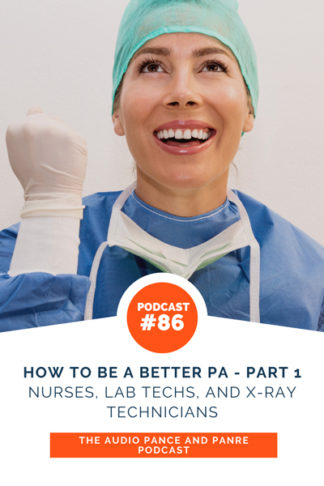Podcast: Play in new window | Download
Subscribe: Apple Podcasts | RSS
This is part one of a special three-part podcast series by Joe Gilboy PA-C on becoming a better PA.
Part one is all about building amazing relationships with our nurses and ancillary staff.
You may be thinking to yourself, “Hey Stephen, I thought this podcast was about the PANCE and PANRE.” “How does talking about nurses and ancillary make me a better PA or help me pass my boards?”
If you asked this question, then you have come to the right place.
Because as anybody who has ever worked as part of a healthcare team can tell you, the key to your success as a PA has little to do with you and a lot more to do with how you treat other people.
So how do you become a better PA?
Let’s jump right into this unique episode of The Audio PANCE and PANRE Podcast. You can listen to the podcast below and read the summarized (and edited version) of the transcript or listen in your podcast player of choice.
The Audio PANE/PANRE Podcast Episode 86: How to be a Better PA (Part 1 of 3)
You can also click here to listen to or download this episode.
Episode Transcript and Summary
This episode was recorded by Joe Gilboy PA-C and edited for clarity and readability by Stephen Pasquini PA-C.
I’ve been a PA in the emergency department for 35 years. And you can imagine, I’ve had a lot of interaction with nurses and ancillary staff. I want to pass on some wisdom and guidelines to help you deal with the nurses and ancillary staff.
This will help you become the best PA you can become and help you immensely in your career and, most importantly, with your reputation.
Become Best Friends with the Nurses

The first group of people we’re going to talk about is the nurses. And this is a big one, folks, my God, how big is this!
So, to all my new graduates out there, I really need you to listen to me, stop what you’re doing, and let this bounce around in your head for a second. As a new graduate, your nurses will know more than you. That’s right, you heard me, they will know more than you.
So, let’s say you’re working at an urgent care family practice clinic or working in a neurology clinic. There you are seeing your patients, and the nurse will know more than you on how this patient needs to be worked up, which labs or imaging tests to order, and what the doctor likes.
So, what I always tell my new graduates to do, and what you need to do, is become best friends with the nurses because sometimes (a lot of times), they’re going to know more than you!
As time goes on and as you become more experienced and more seasoned, yes, you will know more than the nurses, which is just a byproduct of time and experience. I can’t fast forward time, but I can tell you that the nurses will know more than you initially, so follow them.
They’re going to point you in the right direction. They will say, “Hey, you know Dr. Smith likes it this way, or Dr. Jones likes it that way or, whoever the person that you’re working with, this is how I like to work with them” Follow them, and if they like you, they will lead you in the right direction.
Make the Nurses Part of Your Team

The second thing you need to understand about the nurses is that they like to be part of the team. They like to feel like they’re part of the team and know that you recognize their experience and expertise when working up the patient.
The worst thing you can ever say to a nurse is this: “I’m the PA; you’re the nurse; you must do what I say.”
As soon as you say this, there are two things you should do:
- Sign your organ donation card
- Pick up the phone and call The Legacy Group, you know, that’s the organ donation team that we have here in California, and they’re going to come and harvest your organs, and you will be dead.
And that’s what’s going to happen. Don’t ever say that to the nurses!
What should you say instead?
Ask for Input from the Nurses
What you should say to the nurses goes something like this: “hey, so what’s your input?”
It’s that easy!
Honor Input from the Nurses
There will come a time, and it’s going to happen to you, where the nurse is going to want to order something that you may not 100% agree with. What should you do then?
If it’s not doing any harm to the patient or it is something that’s no far outside the standard of care, your interaction should go something like this: “Okay, I see your point, I agree with you, let’s add this lab test (or this other study) that we may want to do.”
Now let’s say the recommendation made by the nurse is way outside the standard of care. For example, let’s say you have someone with an ankle sprain and your nurse wants to order a CAT scan of the head. And you’re like, “okay, this is not going to work out well.”
So now, at that point, what’s the best way to disagree with nurses, but do it politely?
You can say this: “I hear you loud and clear. However, I think that what’s going to serve our patient best is not a CT of his head, but let’s x-ray his ankle.”
“I hear you!” This is the magic word. This is what they need to know: That you hear them, you respect them, and that they are part of the team.
Embrace “The Doughnut Theory”

The doughnut theory works like this: You bring doughnuts to your clinic or hospital department once a week, then watch what happens!
That $7 worth of doughnuts is going to change everything!
The nurses are going to be like, “who brought the doughnuts?” “Oh look, you know the new PA Allison over here she brought the doughnuts, and we love Alison.”
Suddenly, PA Allison is a superstar! Like, oh my gosh, we love Alison! And every Wednesday, they’re going to be looking at the door like, hey, did Alison bring the doughnuts?
Feed the nurses! I know this sounds crazy, but feed your nurses, and they will love you!
Another thing that you should bring the nurses once a month is pizza. I know this sounds crazy. Again, you’re like, what’s Joe talking about? But trust me when I tell you that you should buy the staff pizza once a month. Pizza is a universal food. I even think aliens from other galaxies like pizza!
We are Family . . . All the Nurses, MAs, and Me!
The nurses need to feel like you are part of the community. You’re part of the family. Because what this is about is family.
They did a recent study in the ER about how much time we spend with the nurses. Do you realize that I spend more time with my nurses than I do with my wife?
This is a well-documented fact. Because anybody who’s been married knows what I’m talking about. When you come home, what’s going on? You’re doing this, and your spouse’s doing that. They’re picking up the kids, and you’re going to Costco. You’re over here, and they’re over there.
But to have quality time with your spouse? That’s exceedingly rare!
How many times are you two feet from your nurse? Discussing issues? My nurse is my spouse!
I tell everybody I have twenty-seven work spouses at my job. I’ll be talking to my wife on my cell phone, and the nurses show up, I will hang up on my wife to talk to the nurse.
Their Opinion Matters
At the end of the year, when you show up for that evaluation with your boss, do you know who she’s talking to? Yes, that’s right, the nurses!
Your supervisor will ask, “So what’s Allison like to work with?”
And if you have implemented the above tactics correctly, the nurses go, “Man, we love Allison! she brings doughnuts, she brings pizza, she talks to us very respectfully, if we disagree, she’ll listen and talk to us.”
You need to treat them with respect and treat them like family members. Because that’s what they are. If you feed them, treat them like family, and treat them with respect. Oh, wow. Watch what happens.
Your nurses will look at you like, “Oh, man, Allison’s here today!” And this is what you want to be the PA that everybody’s excited to see when you walk through the clinic door, the OR door, the emergency room door, the urgent care, or wherever it is that you’re working. It’s like, “Oh, my gosh, Alison’s here today.” “All right, this is a great shift!” And when you showed up, you brought doughnuts.
And that is the sweet spot. That is where your reputation really starts to grow.
When you apply to a new job, what do they always ask for? Your background and experience! And when they call your boss, it’s about your reputation.
One of the questions they always ask is, “What is Allison like?” “Oh, Allison’s great, and the nurses love her!” And that is a slam dunk! Once they hear that, their next thought is, “Oh, wow, we want this person!”
Think about it for a second. Really pull back and give this some thought. Imagine you’re a physician hiring a PA. Imagine that the other previous employer tells you, “Well, you know, he’s had some run-ins with the nurses.” And then you call the other applicant who’s applying for the same job, and their supervisor is like, “Oh, he’s great, and the nurses love him.” Which PA are you going to hire?
Exactly, the one that has a good relationship with the nurses!
What I’m really trying to encapsulate here is this:
- Always be respectful to the nurses.
- Understand that sometimes the nurses will know more than you, and that’s OK.
- Feed the nurses doughnuts and pizza
- Treat them like a family member – like your mom, dad, brother, or sister.
And you will see how well this works! Make no mistake, in my 35 years as an ER PA, I’ve seen so many PhDs who’ve been disrespectful to nurses, and what has happened to them? It’s not good!
Remember, at the end of the year, this is what your boss is looking at. And then if you have a good relationship with the nurses, guess who gets to ask for more money? That would be you. And guess whose reputation just grew? That would be you.
Love Your Lab Techs

The next group of people you need to be nice to and get to know very well are your lab techs.
As you go through your PA career, make sure you become very friendly and are exceedingly kind to your lab techs. Let me tell you why.
The lab techs have an important job that often goes unseen. They come, they draw the blood, do the cultures, etc. etc. They do much of their work behind the scenes. You don’t see it. You see the results.
When you’re nice to the lab techs, and you treat them with love and respect, one of these days, you’re going to have trouble ordering a specific test. There you are poking around your EMR, maybe you are in Epic, and you can’t figure out what to order.
Then lo and behold, you call the lab to ask their advice, and they’re going to say, “Hey, you know, this is Allison. And we’re good friends with Allison, and she’s nice to us, right?”
Then suddenly, when you call down to the lab and say, “Hey, guys, how do you put in the order for this specific test?” And what’s going to happen? They’ll walk you right through it, and they’re going, “Hey, no problem, we’ll take care of it!” “And you know what, Allison, we’ll put in the order for you? No big deal.”
When you are friendly with the lab techs, they’ll draw extra tubes of blood, saying, “Hey, you know, just in case Allison forgot to ask to order this, we’ll have it done for her.”
Or say you’re working at a family practice clinic, a neurology clinic, or an OBGYN clinic. And there you are, it’s 4:30 in the afternoon, and you want to get off at five. You just sent down a urinalysis and a pregnancy test, which usually takes about 45 minutes to an hour to result.
And there you are, waiting to meet friends at 5:20, and it’s 4:30 pm, and you are thinking, “How am I going to get this done?”
Well, if you’re friendly with the lab techs, and you call down and say, “Hey guys, is there any way we can rush this pregnancy test and urinalysis?” And they say, “Oh, for you, Allison, anything!”
And there it is!
So, in other words, they will help you get things done on time and make you a better PA.
The lab techs are some of the most important people you’ll meet in the hospital, not hospital administrators.
So, as you go through your PA career, get to know your lab techs. Be friendly with them, get to know their first names, and take time to understand how they do things.
X-Ray Technicians

The last group of people we’re going to talk about is our X-ray department, including our X-ray techs, our ultrasound techs, CT techs, and even the radiologists.
When you’re working your patients up, you must wait for your labs, you must wait for your nurses to do their work, and then you’re waiting for the X-ray tech or CT tech, or the ultrasound tech to get that imaging study done. And what I’ve learned in my 35 years is that the radiology department can slow you up the most.
I agree; sometimes, the lab can slow you up. But what you’ll find out nine times out of ten, when you get to the end of the day, what was really the thing that took the longest? Your radiology imaging test.
So please get to know your X-ray techs or your CT techs, and get to know the girls or the guys in the ultrasound department, get to know them on a first-name basis.
Because soon, the day will come that you’re working in the ER, the urgent care, family practice, or in the surgical suite, and you need the X-ray tech to come and perform a chest X-ray or bring in the CRM fluoroscope. You need this done quickly because you’re in a rush, or the patient is in critical condition.
Or maybe you’re reducing a fracture, and you want to see what the post-reduction looks like before you even put in the splint.
This is when knowing the folks in the radiology department are going to serve your best interests.
So, let’s say you’re ordering a post-reduction study on a wrist fracture. So, there you are, you have reduced the fracture, and before you place the patient in the splint, you need the post-reduction study.
Now, since I’m good friends with the X-ray techs, I can give them a call and say, “Hey can you guys come over here and take a post-reduction x-ray really quick?”
And they’re going to be like, “No problem, Allison, we’ll come over and take it because it’s you, you’re the one that’s nice to us, don’t worry, we’ll put the order in for you.”
And then everything goes nice and smooth.
One of these days, it will be 4:30 in the afternoon, and you’ve got a patient with a finger fracture. Your patient is the fifth one in the row, which means you’ll be there for the next hour.
But you’ve got to go to your kid’s soccer game in an hour. And now you’re like, “Man, I wish there’s some way I could get this x-ray done quickly.” This is when knowing the x-ray techs becomes valuable.
Be Nice to Everybody

Be nice to everybody!
This entire podcast episode is about building your reputation. This is about you as a PA. If you follow this advice, your colleagues will start viewing you as the nice PA that’s always respectful, knows everyone by their first name, and is always polite. And as a byproduct, everyone will be more than happy to do something nice for you.
It’s a human behavior thing; it’s not a medical thing; it’s a human thing. When human beings are nice to you, you’re more likely to be nice back and do favors for them in return.
That’s exactly what this boils down to. And I’m trying to make your job more efficient. Most importantly, I’m trying to get you to work on a better reputation, and this is what’s going to carry the most weight because every job you apply for, what do they ask for? Your references!
And what are they going to do? They’re going to call your previous employers. What is their conversation going to be based upon? It will have nothing to do with where you went to PA school. It will have absolutely nothing to do with your PANCE scores. It’ll have everything to do with your reputation.
Podcast two, which is coming up next, will be all about medical staff, administrators, and office managers and how to handle them. And that one is a big one, folks. So be your best, do your best. And try to build a great relationship with everybody you work with!
I’ll see you soon for podcast number two.
– Joe Gilboy PA-C

